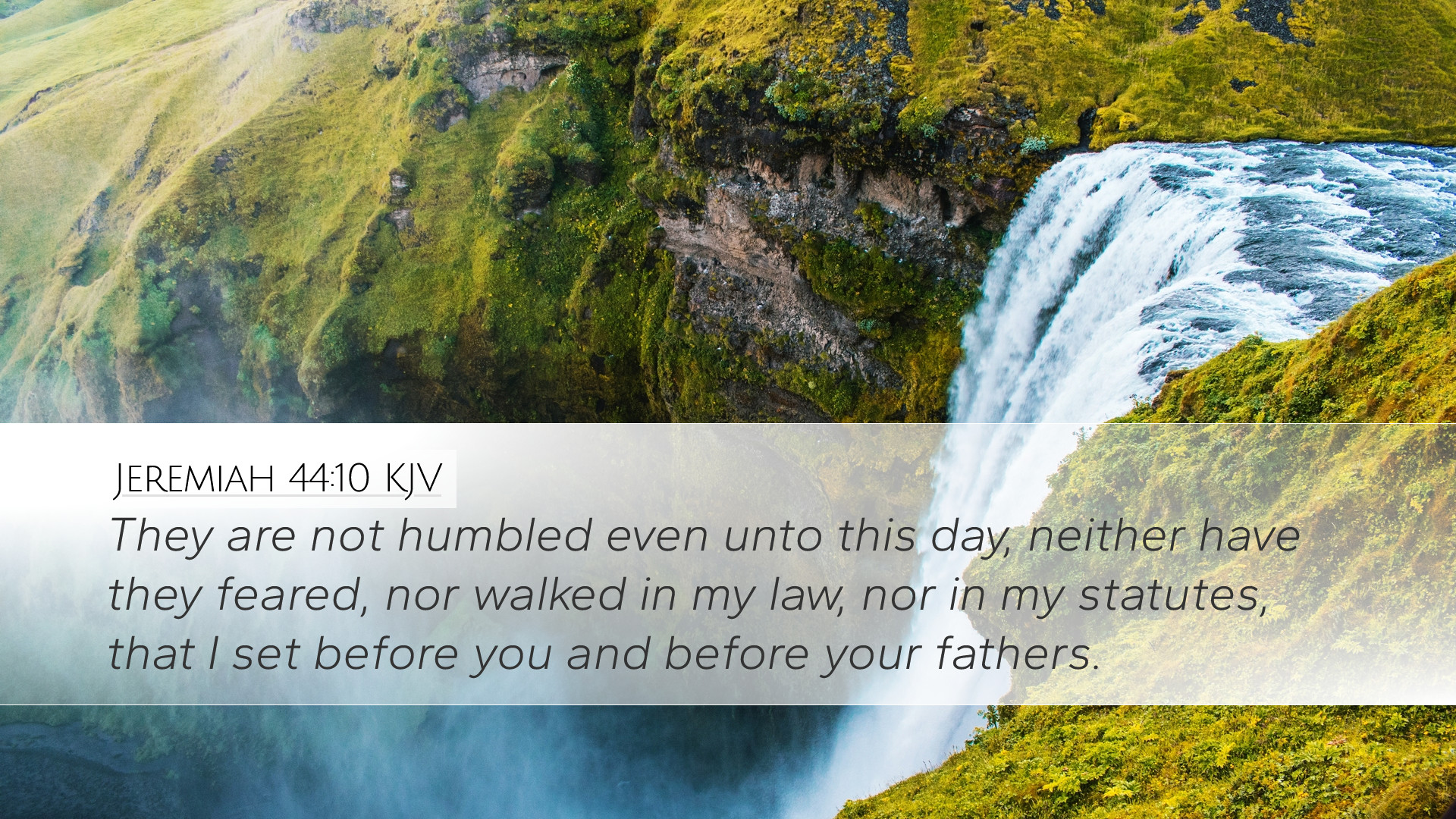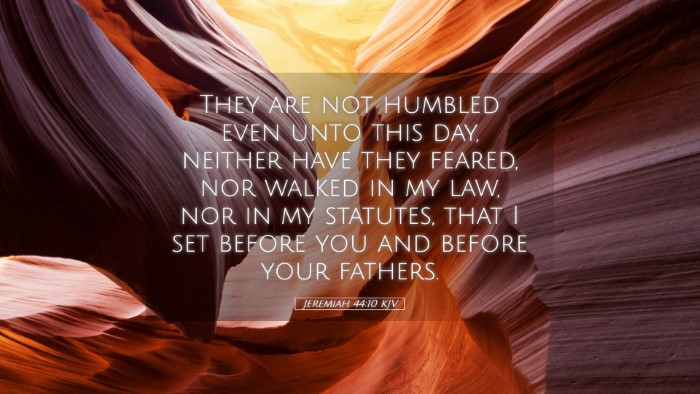Commentary on Jeremiah 44:10
Bible Verse: "They are not humbled even unto this day, neither have they feared, nor walked in my law, nor in my statutes, that I set before you and before your fathers." (Jeremiah 44:10, KJV)
Introduction
The book of Jeremiah is rich with profound reflections on the nature of Israel's relationship with God, often highlighting themes of rebellion, unfaithfulness, and the consequent judgments. Jeremiah 44:10 offers a critical insight into the spiritual state of the people in Egypt after the fall of Jerusalem, where they continued their idolatrous practices despite the looming judgment that had befallen them. This commentary synthesizes insights from public domain commentaries to reveal the depth and implications of this verse.
Contextual Background
Jeremiah prophesied during a tumultuous time for the nation of Judah, facing the Babylonian invasion and eventual captivity. Following these events, a remnant of people fled to Egypt, seeking refuge and security but encountered spiritual downfall instead. In this chapter, Jeremiah speaks to these exiles, who exhibit a stubbornness towards God's call to repentance and warning against idolatry.
Exegesis of the Verse
The phrase "They are not humbled even unto this day" indicates a continued state of pride and obstinacy among the people. Matthew Henry comments that true humility is produced by an acknowledgment of sin and a genuine response to divine correction. These exiles showed no such inclination, reflecting a hard-heartedness that persisted despite evident signs of God’s disfavor.
-
Spiritual Hardness:
Henry notes Israel’s refusal to humbled themselves mirrors human nature's propensity to ignore divine warning. The consequence of such hard-heartedness leads to spiritual blindness and an eventual deeper plunge into sin.
-
Lack of Fear:
The lack of fear of God is a profound indictment. As Albert Barnes points out, the fear of God is essential for wisdom, obedience, and moral integrity. The absence of this fear among the Israelites showcases their estrangement from the holiness and justice of God.
-
Failure to Walk in God's Law:
The refusal to "walk in my law" speaks to a conscious choice to disregard God’s commandments. Adam Clarke elaborates that this reflects not only disobedience but also a rejection of the covenant relationship established by God, which demands fidelity and righteous living from His people.
Theological Implications
This verse invites serious theological reflection regarding the nature of human depravity. The stubbornness of the Israelites in the face of enormous consequences exemplifies a persistent human tendency to resist divine truth, an idea explored extensively by various commentators.
-
Consequences of Idolatry:
The choice to engage in idolatrous worship, as seen in these exiles, reflects a broader theological principle: that seeking comfort in alternatives to God leads to spiritual decay. Barnes emphasizes that God’s statutes are not simply laws, but principles guiding humanity towards genuine life and fulfillment.
-
The Nature of God's Waiting:
The expression "even unto this day" points to God’s patience and forbearance. The prolonged opportunity for repentance is a demonstration of divine grace, though Henry suggests it also reflects sorrow as God laments over the obstinacy of His people.
-
Implications for Modern Believers:
Present-day followers of Christ must heed this cautionary tale. Clarke warns modern believers about the dangers of neglecting spiritual growth and the pitfalls of idolatry, emphasizing continual repentance and alignment with God’s will.
Practical Applications
For pastors and church leaders, this verse serves as a reminder of the responsibility to preach faithfully against complacency and secular idolatry. Engaging congregations with themes of accountability and humility is crucial for nurturing a vibrant spiritual life.
-
Encouragement Towards Humility:
Believers are called to cultivate a lifestyle of humility before God. Regular self-examination and confession are vital in ensuring that they remain sensitive to the Holy Spirit's leading, which aligns with the exhortation found in this verse.
-
Fostering a Fear of God:
A communal sense of the fear of God can be developed through worship, teaching, and shared experiences of God's holiness and judgments, aligning with Barnes’ insights. This can be pivotal in revitalizing faith communities.
-
Commitment to God's Law:
Emphasizing the importance of walking in accordance to God’s statutes can encourage believers to actively pursue righteousness, reflecting both the love for God and the desire to fulfill His purposes.
Conclusion
Jeremiah 44:10 serves as both a mirror and a warning for God's people across generations. Through insights gathered from respected commentaries, the message of despair in the face of rebelliousness is clear: God desires humility, fear, and adherence to His way. As believers study and reflect upon this verse, they are reminded of the enduring call for repentance, the inherent dangers of hard-heartedness, and the necessity of living according to God’s revealed truth.
May this reflection provoke deeper understanding and responsive action towards the truth of God's word in the hearts of all who engage with it.


